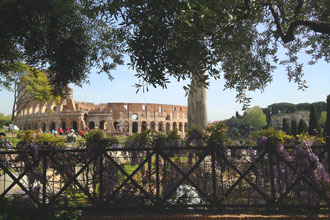 |
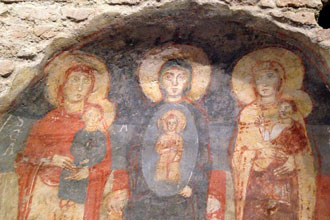 |
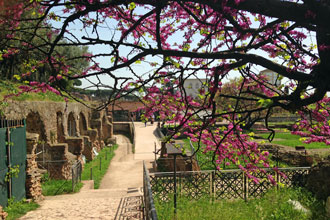 |
||
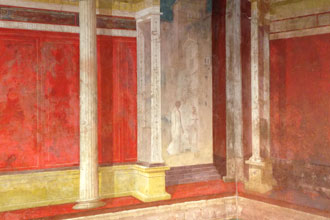 |
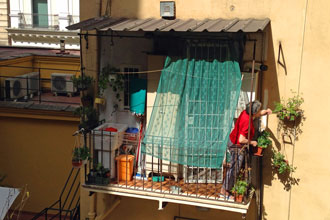 |
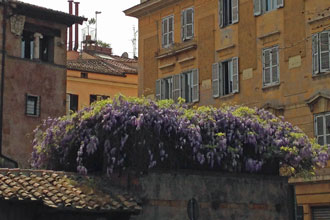 |
||
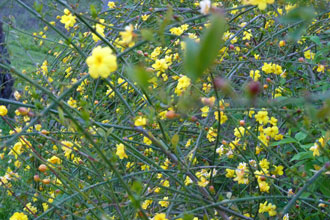 |
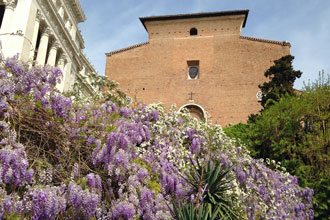 |
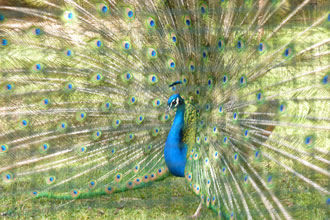 |
||
9 April 2016
When I walked across the Tiber Island in Rome on Tuesday, the thermometre outside the farmacia said 30° (86°F). Granted, the thermometre was in the sun. Then again, so was I and all 30 of those degrees were beating down on my hatless head. That was April 5. And spring, as I keep saying, is always changeable. But 30° seems just a tad on the too-hot side.
The whole of Rome is awash with blooms. Wisteria is tumbling everywhere. The Judas trees (Cercis siliquastrum) were losing their flowers already, leaving a carpet of marvellous mauve. Up in the northern suburb where C is currently living, there are streets and streets planted with some kind of flowering cherry, the chubby bunches of pink-blushed flowers looking dreamy.
I followed L to Rome where he had plunged back into a Golden Age, one in which the internet start-up he is working with is paying him expenses, and a per diem, as well as a writing fee. In this day and age, that is unheard of.
It is odd when you look back to how travel writing used to be. When I first edited Time Out Guides, I was paid what by current standards was an extremely generous editing fee. That was just for my ideas, and my organisational skills, and my ability to knock sentences into shape. Then I had a commissioning fee, which I spread between myself and trusted writers for the actual copy. And then there were expenses: a generous dollop to foot the bill for restaurant research and hotel stays. Oh, I’m forgetting the extra sum for my fact-checker – not huge, but a separate amount for what was always the most grinding task. You were never going to get rich on the fees paid, but you could live a decent life.
In 2008, publishers used the financial crisis as an excuse for drastic slashing. I suspect they had been looking for a way to do it for a while. After all, the internet meant not only that many people had ditched guide books as a piece of essential travel gear but also that everyone thought themselves more than qualified to review anything: if they could see their reviews in print, they were even happy to do it for little or nothing. The whole art? craft? became debased. Experienced travel writers found themselves battling a tidal wave of approximation and mediocrity. And publishers were happy to make savings on the back of it, however deleterious the effect for the end user who was no longer guaranteed any real level of knowledge, qualifications or accuracy.
My final efforts for the now-defunct Time Out Guides were very recent. I agreed, glumly, to update my Rome and Venice titles only because I couldn’t let anyone else fiddle about with my babies. Had I been doing it for the money, it would hardly have covered the electricity to power my computer. One desultory fee – not much more than I used to get for my beleaguered fact-checker – was for everything. The word ‘expenses’ no longer existed. It all reeked of misery.
For this Rome jaunt, we stayed in a new-ish hotel, the rather delightful Fifteen Keys in lovely Monti. This very central area – ancient Rome’s seething Suburra slum – has grown hipper and hipper in the last few years. Hopefully it will not become a parody of itself.
Just streets away, up towards Termini railway station, are some of Rome’s drearest clueless-tourist hotels. The Fifteen Keys is different in every way. And it neatly confirms my theory that the best people to run hotels are new to the trade (the jaded, cynical hoteliers have the station-side ones) but have entered it having spent far too much time in hotels. Because it’s these people (if they’re discerning at all) who know where the others go wrong, and set out to avoid those mistakes. The owners here are a dentist (OK, perhaps he doesn’t fit my bill entirely) and his wife who worked for some big American accommodation-sector financial evaluation company. She has seen them all.
The rooms they have created are smoothly contemporary without being minimalist, the colours are striking, the staff is young and competent and just right, the courtyard is sweet (though I wanted to tell her that those suffering silver birches will never pull through in Rome), the feel sophisticated but neither pompous nor pretentious. It’s comfortable.
Nowadays as we do our accommodation-evaluating rounds, I’m constantly making (mental) notes for my own project, trying to benefit from a double whammy of experience: their initial break from the hotel past, and the solutions they have brought to the sector. At the moment, this tends to involve my tape measure rather a lot. (I leapt with joy when I realised that the perfectly feasible corridor in our room became even narrower than the narrowest of my planned corridors which I had been worrying would look terrible… it doesn’t take much to make me happy.) Anyone watching me measuring the size of shower stalls and distances between loos and bidets would wonder what kind of madwoman they were harbouring.
As we played the sophisticates in our smart Roman digs, the elderly lady across the courtyard from our balcony played the timeless Roman housewife, scrubbing her outside sink and plucking weeds out of her pots on her own little balcony. Rome’s good for bringing you back to basics.
I returned to the Forum, this time to see Santa Maria Antiqua. Like Domitian’s ramp, it is one of those Forum areas that has been in restauro forever, with openings planned, announced, forgotten. For the time being, however, the sixth-century church is visitable, and the crowds that swarmed the Forum on that hot, blue day were making their way around it in huge numbers. The church is rather lovely, both its structure and the worn frescoes of wide-eyed saints, emanating that simplicity peculiar to the art produced after the city’s brilliance had faded.
Now forgive me if I go off on another of my rants: the (mis-)handling of Rome’s spectacular heritage always has this effect on me. Inside this church there was one custodian, who was talking on his phone; another woman may or may not have been on the staff. I was being jogged along by the masses of people, most of them staring blankly at the chipped remains on the wall. One man just in front of me spat on his finger and had a go at rubbing a bit of fresco, just to see what would happen. Now, I’m all for a rather laxer interaction between antiquity and viewer than, say, you might get in nothing-if-not-behind-perspex GB. But this was ridiculous.
At the other extreme was Augustus’ House on the Palatine, where we had last been many many years ago, when the restoration had only just been completed. I recall, from my guide-writing days, that for several years afterwards those in know could, for no extra charge, book a time slot to enter the house when they bought their tickets to the Forum/Palatine. It was open all day, but numbers were controlled and staff were there to ensure that no one got too close to the gorgeous, glowing frescoes.
Now it’s open once a day. A girl lets you in, watches you as you mooch around – here and the Casa di Livia next door – then ushers you out. This costs €4 extra, on top of the regular ticket. And almost no one does it because very few people notice the dog-eared scrap of paper tacked up by the ticket office which is the only indication that the area even exists. What are they thinking of?
For the last couple of days it has been drizzling, after weeks without damp of any kind. I have been watering, from time to time, between trying to convince myself that the dew is enough. I had this morning earmarked for a serious bout with the hose but now I’m in that limbo where I don’t think enough has fallen to give my plants any real respite but it looks like more is on the way so it would be pointless for me to spend much time intervening. I wish it would tip down.
The irises are out; the cherry trees are already tipping over, past their prime; the dark pink flowers of the crab apple are looking wonderful. For the first time ever my winter jasmine has decided to cover itself in yellow: usually it looks twiggy with some faded yellow blobs, then becomes a wall of green. Did I prune it better last year? The roses are bursting into very healthy-looking leaf, for which I heave a sigh of relief each time I walk past them: the damp years when the leaves come out black-spotted right from the word go are painful for the soul. Often when I look across the valley I think “oh no, bush fire!” only to remember that those smoky drifts are pretty Prunus. Visiting a garden project I’m working on south of Siena, the owner’s peacock had his spring livery on and was doing his magically coloured, tail-clattering courting dance to a couple of bored looking peahens.
Yesterday morning I went to our little CdP hospital to pick up an old xray of my shoulder, done shortly after we returned from New York where I had fallen painfully off a bike. I needed a copy of the xray itself, but the people in the radiology department were terribly keen I should take advantage of their New Technology, and desperately wanted to give me a PIN to access my results on line. I explained that I needed the picture, to take with me when I do an MRI scan of the still-troublesome joint.
They provided me with this, but then the man at reception looked at the place of birth (Brisbane) on my ID card and said “I bet you’ve got lots of friends and family in Australia, right?” I told him that I had left when I was very young, so didn’t have any friends, but that I had a sister there.
“Can you do something for me?” he said, printing out the file number and PIN for my xray. “Can you get her to take a look at this?”
This was slightly baffling. I asked him why.
“Well,” he said, “I know that one of the Ws in www means mondo (world) but I don’t believe it.”
What?
“I mean, she can’t really see it in Australia, can she?”
I told him I thought she probably could. Technology, you know: it does some pretty amazing stuff. But I promised faithfully to go back and report, and (if I remember) I think I will. He seemed inordinately pleased.
Right after, I dropped by my new house for a chat with the builder who will, hopefully, begin work in the not-too-distant-future when all my papers are in order. I had locks to replace – freshly oiled after half Umbria’s dead insect population was removed from their innards – on the cubby holes for the electricity and water meters outside the front door. I gave the electricity switch a quick flick, and, to my shock, the lights came on. Two days after sending the rquest to have it reconnected. I was incredulous.
“It’s only so they can start charging you. They never waste time where there’s money involved,” was the builder’s judgment.